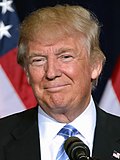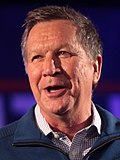| Poll source | Date | 1st | 2nd | 3rd | Other |
|---|
|
| Primary results [9] | March 1, 2016 | Donald Trump48.99% | John Kasich17.94% | Marco Rubio17.75% | Ted Cruz 9.50%, Ben Carson 2.57%, Jeb Bush 1.03%, Chris Christie 0.30%, Rand Paul 0.29%, Carly Fiorina 0.18%, Jim Gilmore 0.12%, Mike Huckabee 0.11%, Mike Huckabee 0.08%, George Pataki 0.08%, Rick Santorum 0.05% |
| Emerson College [10] Margin of error: ± 4.8% Sample size: 408 | February 26–28, 2016 | Donald Trump
51% | Marco Rubio 20% | John Kasich 14% | Ted Cruz 10%, Ben Carson 1%, Undecided 1% |
| UMass Amherst/WBZ [11] Margin of error: ± 6.3% Sample size: 292 | February 24–26, 2016 | Donald Trump
47% | Marco Rubio 15% | Ted Cruz 15% | John Kasich 11%, Ben Carson 2%, Other 7%, Don't Know 3% |
| Suffolk University [12] Margin of error: ± 4.4% Sample size: 500 | February 24–26, 2016 | Donald Trump
42.6% | Marco Rubio 19.8% | John Kasich 17% | Ted Cruz 8.8%, Ben Carson 3.8%, Other 1%, Don't Know 7% |
| MassINC/WBUR [13] Margin of error: ± 4.9% Sample size: 386 | February 21–23, 2016 | Donald Trump
39% | Marco Rubio 18% | John Kasich 17% | Ted Cruz 9%, Ben Carson 5%, Don't Know 12% |
| Emerson College [14] Margin of error: ± 5.7% Sample size: 289 | February 19–21, 2016 | Donald Trump
50% | Marco Rubio 16% | John Kasich 13% | Ted Cruz 10%, Ben Carson 2% |
| Suffolk University [15] Margin of error: ± ?% Sample size: 134 | November 19–22, 2015 | Donald Trump
32% | Marco Rubio 18% | Ted Cruz 10% | Jeb Bush 7%, Ben Carson 5%, Carly Fiorina 4%, Chris Christie 4%, John Kasich 2%, Rand Paul 1%, Mike Huckabee 0%, Rick Santorum 0%, Lindsey Graham 0%, George Pataki 0%, Jim Gilmore 0%, Undecided 14% |
| Emerson College [16] Margin of error: ± 5.9% Sample size: 271 | October 16–18, 2015 | Donald Trump
47.8% | Ben Carson 13.9% | Marco Rubio 11.8% | Jeb Bush 7.1%, Carly Fiorina 6.5%, Ted Cruz 5.1%, John Kasich 2.8%, Chris Christie 2.3%, Lindsey Graham 0.9%, Mike Huckabee 0.4%, Rand Paul 0.1%, Undecided 1.4% |
| Emerson College [17] Margin of error: ± ? Sample size: 216 | March 14–19, 2015 | Jeb Bush
19% | Scott Walker
19% | Ben Carson 13% | Rand Paul 7%, Chris Christie 6%, Ted Cruz 6%, Mike Huckabee 3%, Other/Undecided 28% |
| Suffolk University [18] Margin of error: ± 4.9% Sample size: 400 | August 21–24, 2014 | Chris Christie
11% | Paul Ryan
11% | Jeb Bush
10.75% | Rand Paul 10.5%, Mike Huckabee 7%, Scott Walker 6.75%, Marco Rubio 5.75%, Rick Perry 4.75%, Ted Cruz 4.25%, Bobby Jindal 3.5%, Rick Santorum 2.75%, Jon Huntsman Jr. 1.75%, John Kasich 1%, Undecided 18.25%, Other 0.5%, Refused 0.5% |
Mitt Romney
48.62% | Chris Christie 7.69% | Paul Ryan 5.54% | Jeb Bush 5.23%, Ted Cruz 3.69%, Jon Huntsman Jr. 3.38%, Bobby Jindal 3.38%, Rand Paul 3.38%, Scott Walker 3.38%, Mike Huckabee 3.08%, Marco Rubio 2.77%, Rick Perry 1.54%, John Kasich 1.23%, Rick Santorum 1.23%, Undecided 4.92%, Refused 0.92% |







